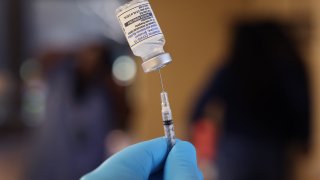
- Omicron subvariants BQ.1 and BQ.1.1 now make up 44% of new Covid cases, compared with 32% last week, according to CDC data.
- These subvariants will likely become dominant in the next week.
- But BQ.1 and BQ.1.1 are likely resistant to Evusheld, leaving people with compromised immune systems increasingly vulnerable as these subvariants become dominant.
Omicron subvariants resistant to key antibody treatments will soon make up a majority of new Covid infections in the U.S., according to the Centers for Disease Control and Prevention.
Omicron subvariants BQ.1 and BQ.1.1 now make up 44% of new Covid cases compared to 32% last week, according to CDC data. These subvariants will likely become dominant in the next week.
The once dominant omicron BA.5, meanwhile, is being displaced and now makes up 29% of new infections.
BQ.1 and BQ.1.1 pose a special threat to people who have severely compromised immune systems, such as organ transplant patients and people on cancer chemotherapy.
Get Tri-state area news delivered to your inbox. Sign up for NBC New York's News Headlines newsletter.
People with compromised immune systems often do not mount a sufficient response to the Covid vaccines and as a consequence need additional medications to protect them from the virus.
Money Report
Many people with moderate or severely compromised immune systems take an antibody cocktail called Evusheld to protect them from severe disease. It is administered as two injections every six months.
But BQ.1 and BQ.1.1 are likely resistant to Evusheld, according to the National Institutes of Health. This leaves people with compromised immune systems increasingly vulnerable as these subvariants become dominant.
BQ.1 and BQ.1.1 are also likely resistant to bebtelovimab, a monoclonal antibody people with compromised immune systems can take to prevent severe disease from Covid after an infection.
Although Pfizer's antiviral Paxlovid remains effective, organ transplant patients often cannot take the pill because of the way it interacts with other medications they need.
White House chief medical advisor Dr. Anthony Fauci, in a radio interview last week, said the U.S. is at a crossroads in the pandemic as the more immune evasive BQ subvariants increase weekly.
"The thing that's of concern to us is that some of our tools in our armamentarium may be negated if in fact these newer variants become much more dominant than they are," Fauci said
And there are no replacements for drugs like Evusheld on the way. White House Covid response coordinator Dr. Ashish Jha has blamed Congress for failing to pass additional funding for the nation's pandemic response. Republicans have blocked more Covid money since the spring.
"We had hoped that over time as the pandemic went along, as our fight against this virus went along, we would be expanding our medicine cabinet," Jha told reporters at the White House last month.
"Because of lack of congressional funding that medicine cabinet has actually shrunk and that does put vulnerable people at risk," Jha said.
President Joe Biden last month altered people with compromised immune systems that they face a special threat from Covid this winter. The president urged them to speak with their physicians about what precautions to take.
Fauci said people who face a high risk from Covid should wear masks indoors in public this fall and winter, and people who have vulnerable individuals in their homes should do the same when they go out.
People should also consider taking rapid Covid tests before going to social gatherings indoors where vulnerable individuals will be present, Fauci said. He encouraged everyone who is eligible to get their Covid booster and flu shots this fall.
"That is a very good way of making sure you don't spread infections, so utilization of tests, wearing masks where appropriate and getting vaccinated," he said.
U.S. health officials believe the omicron BA.5 boosters should provide sufficient protection for the general population against BQ.1 and BQ.1.1 because these subvariants are related to BA.5.






